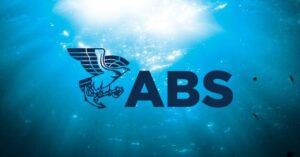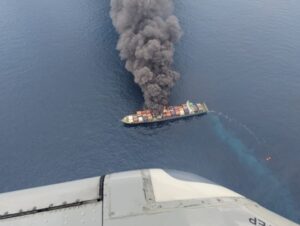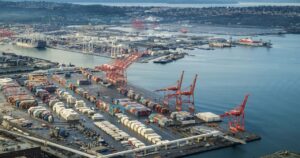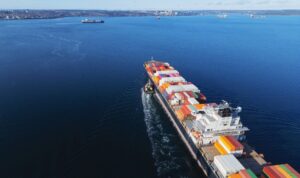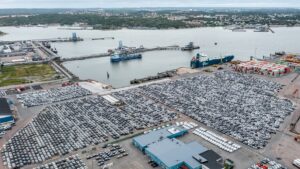A lack of infrastructure and continued opposition on environmental grounds mean the Arctic is unlikely to see commercial shipping in the near future, according to carriers and operators, despite the congestion caused by the grounding of the Ever Given in the Suez Canal.
Global trade was thrown into chaos after the mega-ship blocked the waterway on 24 March 2021 and forced more than 300 vessels to sit at anchor, while many others diverted around the Cape of Good Hope.
However, the world’s major carriers have said they will not use the Arctic region to transport goods and regional stakeholders are not preparing for a rush of containerised traffic.
Speaking to PTI, Russian port and terminal operator Global Ports said it believes the region can one day be used for commercial shipping but would need substantial research.
“We are closely monitoring the growing interest to the Northern Sea Route (NSR). The route has a long-term potential for further development and evaluation of its commercial success requires an in-depth analysis.
“In the case of a successful launch of regular transit cargo traffic along the NSR, we may see the revision of some of the logistics chains.
“But at an early stage likely there will be no dramatic impact, as the volumes declared for the NSR cannot be compared with the current figures for Suez.
However, the company also said a successful commercial launch will not happen any time soon because of the infrastructure development that will need to be done first.
“The launch of regular transit cargo traffic along the NSR is a complex project which requires infrastructure development of various types,” the company explained.
The necessary infrastructure includes “seaports and terminals, transport and logistics hubs, information, telecommunication, year-round navigation and rescue systems, energy complex and others as well as ice-breakers` fleet”.
What are the benefits of the NSR?
The NSR can cut the time of Asia-Europe transportation by as much as 40% and offers the chance to bypass traditional waterways, such as the Suez and Panama canals.
The suspension of the Suez Canal, through which 12% of global trade passes, increased supply chain uncertainty at a time when logistics processes were already strained due to the COVID-19 pandemic.
Currently, a voyage between South Korea and Europe via the Suez Canal will take approximately 34 days and travelling around the Cape of Good Hope 46 days. The same journey via the NSR could take as little as 23 days.
Consequently, the NSR has seen an increase in shipping volume in recent years as the melting ice has opened new potential waterways. Between 2013 and 2019, traffic grew by 25%, according to the Arctic Shipping Status Report.
A huge majority of the NSR is in Russia’s sovereign territory and the government has looked to attract shippers with numerous infrastructure plans and initiatives.
However, the commercial benefits and Suez-induced chaos have so far not convinced the world’s major carriers to use the NSR to ship goods.
Not a viable alternative
Speaking to PTI, A.P. Moller-Maersk (Maersk) said the world is “increasingly seeing the severe consequences of CO2 levels in the atmosphere” and pointed to ice melting in the Arctic as an example.
Maersk is so far the only major carrier to have used the NSR for commercial shipping; in 2018 it conducted a trial voyage “to gain operational experience in a new area and to test vessel systems on ice class container vessels”.
It confirmed to PTI that after the trial it found that the NSR is “not a commercially viable alternative” to its current routes and that it has no current plans to pursue it, despite the obstruction of the Suez Canal.
“The blockage of the Suez Canal would have ripple effects on global supply chains. The focus of our work is finding alternatives that help customers get their goods as soon as possible and rebuild a stable network to support them.”
In a press briefing on 8 April 2021, Hapag-Lloyd CEO Rolf Habben Jansen unequivocally said the carrier had no intention of changing its policy of not using the NSR and reaffirmed its commitment to cutting emissions.
Additionally, Mediterranean Shipping Company (MSC) released a statement confirming its policy to not use the NSR, citing navigation challenges and the risk of oil spillages.
MSC CEO Soren Toft described it as “obvious decision”, saying that the carrier “will not seek to cut through the melting ice of the Arctic to find a new route for commercial shipping” and urged the whole of the maritime industry to do likewise.
“The Northern Sea Route is neither a quick fix for the current market challenges, nor a viable ling term strategy,” Toft said.
Bud Darr, Executive Vice President, Maritime Policy and Government Affairs, MSC, compared the idea of using the NSR to the “ignorant ambition of an 18th century explorer” which would pose a risk to human life and the environment.
Numerous major manufacturers are also committed to not having their goods shipped via the Arctic. In 2020 Ralph Lauren, Puma and Nike were among those who signed a commitment with the Ocean Conservancy to not use the NSR.


